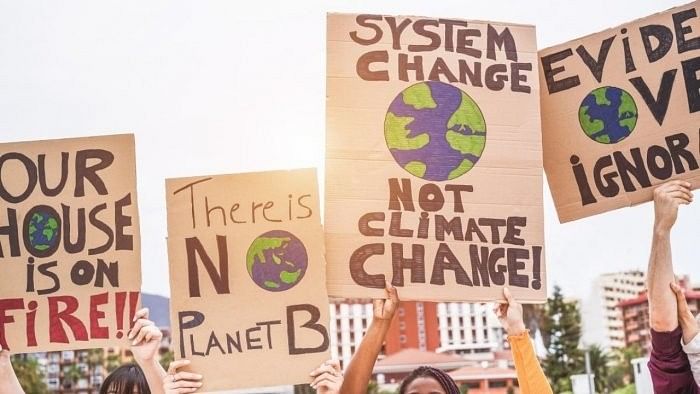
Representative image for climate change.
Credit: iStock Photo
Climate change is threatening India with staggering humanitarian and economic costs, but 15 years after the Centre set up the Expert Committee on Climate Change (ECCC), states and Union Territories are yet to chart a path for adaptation and mitigation. Karnataka’s action plan is pending before the panel for two years, documents obtained under the Right to Information (RTI) Act show.
Besides deaths caused by extreme weather events (2,227 last year), associated risks have a major impact on lives and livelihoods. For instance, air pollution is behind 10 lakh premature deaths in India while the cost of desertification and crop loss is still contested; the Centre attributes an annual loss of Rs 1,000 crore to climate change.
The Centre set up the ECCC in June 2007, which released a national action plan next year, leading to the launch of several missions in the areas of solar energy, ecology and agriculture. In 2009, the Centre directed state governments and Union Territories to prepare State Action Plans on Climate Change (SAPCC).
Since then, the ECCC has held 12 meetings to assess the progress of SAPCC, including the latest on September 21. The minutes of the last eight meetings highlight a lack of clarity and urgency among most states while those who did prepare the SAPCC have seen the document gathering dust.
The minutes show that many states, including Gujarat, Tamil Nadu, Goa, Odisha, Himachal Pradesh and Rajasthan, were yet to adopt the guidelines issued as far back as 2014.
At the meeting on September 21, the committee reminded the states about the guidelines once again: “During the tenth meeting (February 2, 2023), it was suggested that there is a need to connect with all line departments and then take their feedback, especially on socio-economic vulnerability and ensuring rainwater harvesting is compulsory for state-specific tools with respect to the eight chapters presented. It was also suggested to come out with a budgetary action plan for the activities which are proposed to be carried out.”
Sources in the government said the Centre has not been able to assess SAPCC due to the lack of expertise. “An expert panel tasked with steering the preparedness of all states and UTs has held only 12 meetings in 15 years, which shows the lack of urgency. At the same time, consultants with limited experience are reviewing SAPCC which has led to delays,” a source said.
Karnataka waits for nod
Karnataka submitted its revised SAPCC in the beginning of 2021 after incorporating inputs from ECCC members. Along with historical trends and climate change projections, the state highlighted the policy interventions, budget requirements as well as monitoring and evaluation strategies.
As per the action plan prepared by the Environment Management and Policy Research Institute (EMPRI), Karnataka requires Rs 52,827.44 crore between 2025 and 2030 to implement action plans in agriculture, horticulture, forestry, rural development and 10 other sectors.
Karnataka’s plan had stressed the need to mobilise funds from both government, private and multilateral institutions to address current vulnerabilities and prepare a chart for sustainable transition. However, lack of approval for the action plan has made it difficult to prepare detailed project reports and access funds.
Jagmohan Sharma, Director General of EMPRI, which is the nodal agency for Karnataka’s SAPCC, said the approval will help not only in getting funds for adaptation and mitigation works but also to institutionalise key interventions.
“We have submitted the replies to the queries raised by the ECCC and hope to get an approval soon. Besides funds from state and central governments, we want to institutionalise the idea of sustainability. EMPRI has developed the Green Index Portal where all development projects are assessed for environmental compatibility,” he said.